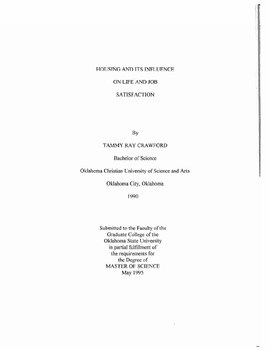| dc.description.abstract | During the past twenty years, researchers have found relationships exist between and among housing satisfaction and quality of life and job satisfaction (Morris, Crull, & Winter, 1976; Henderson, 1987; Andrews & Withey, 1974). Satisfaction with different aspects of housing is influenced by characteristics of the family and the current housing situation (Stewart & McKown, 1977). Housing that does not meet the cultural and family norms tends to lead to dissatisfaction. This research hypothesizes that when characteristics of one�s housing are inconsistent with housing preferences or needs, the family will try to adjust the housing, adapt the family to the housing, or relocate. Housing that does not conform to cultural norms may result in withdrawal and loss of self-respect (Morris & Winter, 1975). The impact of housing on many aspects of an individual and family is understandable when one realizes that previous research has identified housing as more than a she.ter to the occupants. Housing is often considered an extension of one's self and a symbol by which the majority of Americans judge status (Hayward, 1977; Goffman, 1967). The use of housing as a means of communicating status indicates that housing is needed not only to fulfill the need for shelter, but the desire for the right kind of shelter (Morris & Winter, 1978). In addition to the impact of housing on the individual, housing can have an impact on satisfaction with one's job. Individuals who were satisfied with their housing were more likely to report satisfaction with their jobs (Weaver, 1974). Another study identified total housing satisfaction as a strong predictor of job satisfaction among university professors (Henderson, 1987). The degree of satisfaction the professors had for their current housing situation appeared to affect their degree of job satisfaction. Housing was identified as one of the twelve domains of life that contribute to the overall quality of life satisfaction (Andrews & Withey, 1974; Campbell, Converse, & Rodgers, 1976). Because of its influence, housing satisfaction is positively related to overall satisfaction with life (Peck & Stewart, 1985; Marans & Rodgers, 1975). Based on previous research, there appear to be relationships between housing satisfaction and factors such as job satisfaction and life satisfaction. The extent to which employer provided housing, such as the parsonage system for clergy, meets housing needs and the resulting satisfaction is unknown. Religious organizations that provide housing for their clergy would benefit from understanding the role housing plays in improving the level of satisfaction with one's job and life. There are implications for other individuals and families who live in employer provided housing, such as the United States military. | |
